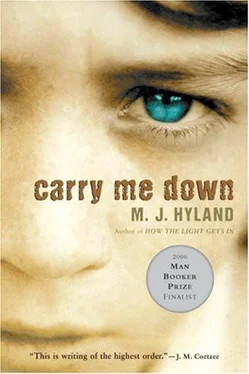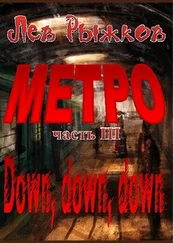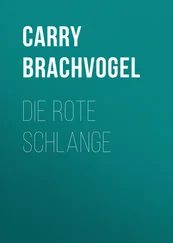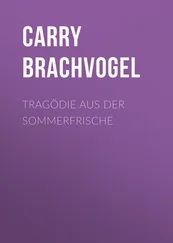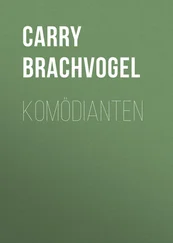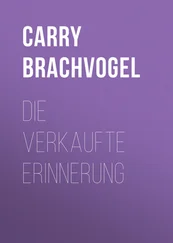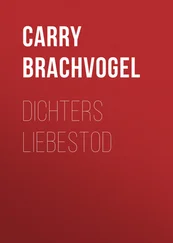‘I don’t like them,’ I say.
‘Don’t be so feckin’ daft,’ he says. ‘The crusts are bread just like the rest of the bread.’
He speaks in an angry rush and the plate tilts in his hands. The crusts are at the edge, ready to fall off.
‘No they’re not,’ I say. ‘Crusts are chewier and harder.’
He hands the plate to me and speaks in a normal, slower voice. ‘Eat your crusts,’ he says. ‘Bread doesn’t grow on trees, and wasting food is a sin.’
‘They hurt my teeth,’ I say. I take the plate and put it on the table but he pushes it into my hands.
‘Eat them, you big eejit, or I’ll ram them down your throat.’
I eat the crusts while he watches. He stands by the cooker with his arms folded. I look up at him when I’ve finished. He smiles without showing his teeth, a tired, cold smile.
‘You see,’ he says. ‘They won’t kill you.’
My mother comes in to get her handbag: she is getting ready to go to the grocery shop in Gorey town, where she now works three mornings a week. She wears her pink coat over a yellow apron.
‘Why don’t you come with me?’ she says. ‘You can spend the morning in the shop and afterwards you can have a bag of sweets to take home.’
‘I’d rather stay here,’ I say. I want to read my new book about lying.
‘Go with her,’ says my father. ‘You’ve hardly left the house lately.’
When we are near the junction, and we should take the right-hand turn, my mother goes left and she says, ‘We need to see Dr Ryan. Just for a minute.’
‘Why?’
‘You need a check-up.’
‘What for?’
‘You’re getting very big.’
‘Is that why you don’t touch me any more?’
‘I do touch you.’
‘Not as much.’
She puts her hands over her face and rubs her forehead with her fingers. ‘You’re not a little boy now.’
‘So? You’re tall and Da’s tall. I’m just like you.’
‘You’re only eleven and you’re nearly six feet tall and your voice is getting deeper.’
‘I’m twelve in July,’ I say.
‘Why don’t we just call into Dr Ryan’s and see what he has to say?’
‘Unless you are going to get me an operation to stop me growing, I’m not seeing any doctors.’
‘There’s no need for an operation.’
‘Then I don’t need to see the doctor. I’m not sick.’
‘I didn’t say that you were sick.’
I hit the dashboard with my open hand. I don’t understand why I didn’t detect the lie when she first told it at home. Why didn’t I know she was lying when she told me she was taking me to spend the day in the shop with her?
‘If anybody’s sick it’s you,’ I say.
She looks at me, to see what I’m going to do. I put my hands under my legs and she looks back at the road. But I can tell she is nervous: she touches her face and swallows too much.
‘What does that mean?’ she asks, at last.
‘You told me I was going to the shop with you. You lied. You tricked me into coming with you.’
‘We’re still going to the shop, so I wasn’t lying. We’re just seeing Dr Ryan first.’
‘If you make me see Dr Ryan now I’ll never trust you again.’
I say this in a voice I’ve never used before, a voice that’s just a little way away from a punch or a kick. My hands are balled up when I say it, and I feel strong. I mean what I say.
‘I don’t see why you’re so upset about this,’ she says, about to cry.
‘It’s very important to be honest,’ I say, almost whispering now and short of breath. ‘You’re a mother. Mothers shouldn’t lie. I don’t want you to ever lie.’
She says nothing.
‘Other people can lie if they want,’ I say. ‘But not you.’
She frowns at me but seems not to be on the brink of tears now. I wonder why she has stopped herself from crying and whether I could still make her cry if I wanted to. ‘Besides,’ I say. ‘It’s a sin to lie.’
She looks at me, calm, as though I have said nothing at all and she turns the car around. We go back to the junction and she makes the turn that takes us to Gorey town. We are going to the shop after all.
‘Are you quite finished now?’ she asks, with the voice she uses on my uncles.
‘Yes.’
I sit in a chair behind the counter next to my mother, listening as she talks to customers about crops, sicknesses and babies.
A woman comes in and says, ‘Helen, we all thought you’d join the Legion of Mary this year!’ and my mother says, ‘How I’d love to, if I only had the time.’
When the woman leaves, my mother tells me that the Legion of Mary is a useless waste of time: a pack of housewives with nothing better to do than complain and gossip and defame their husbands.
I will eat soon and the shelves are packed with tins and boxes of food, and there are dozens of different kinds of sweets under the glass counter.
And then something happens to make my mood brighter still.
Just before it’s time to close up, a salesman comes in wearing a black suit. My mother tells him she has no need for any more biscuits.
‘Are you sure now? Do you not want to discuss it with the manager?’ he says.
‘I am the manager,’ says my mother. ‘And I’m sure.’
He looks at the shelves, makes some notes on his clipboard and says, ‘I think you have a short supply of biscuits here. There are some good ones new on the market.’
My mother lifts the hatch and comes out from behind the counter. She stands close to the salesman. ‘I appreciate the time you’ve taken,’ she says, ‘but I don’t need any more biscuits.’
‘All right, so,’ says the salesman.
My mother puts her hand on his back. Her hand is covered in flour and on his dark suit she leaves the imprint of a perfect white hand, smaller than hers, like the hand of a toddler.
She watches the salesman leave the shop, then she opens the door and stands on the pavement to look at him as he disappears down the crowded street. ‘Bye now!’ she says.
The door closes and the little bell rings. I leap to my feet. ‘You left your handprint on his back,’ I say.
‘I know,’ says my mother. ‘And I’ll never forget the pleasure it gave me.’
I give her a hug, as if we are celebrating some great news. She laughs and squeezes me tight. When she lets go, she kisses me on the cheek and smiles.
She sings as we drive home, and when we turn at the junction she asks me if I would like to come for a walk on Courtown beach and I say yes. This means another half an hour in the car with her on the way there and another hour on the way home.
I eat my sweets as we walk down by the shore. In summer the sand is yellow and the water is blue. Today the sand is not so yellow but bright still, and the water is not so blue but the waves still crash and make white foam and there’s the smell of salt and seaweed, and behind us the dunes are covered in green shrubs and the shrubs look woolly.
Then it rains, it rains hard, but she keeps walking as though she doesn’t notice.
‘Mam! The rain!’ I say, excited by the change in the air, its thinness and the strange smell of metal.
‘Never mind the rain,’ she says.
She holds her face up to the rain and catches the drops in her mouth. I do the same and we laugh as she takes my hand and we walk in the rain with our heads up, while other people rush to the shelter of their cars. It isn’t cold, and once I am completely wet, the rain feels as warm as a blanket.
We arrive home drenched and my shoes and socks squelch as I walk up the drive. My father is sitting at the kitchen table eating soup and my mother goes to the end of the table and stands next to him.
‘Look at your wife,’ she says. ‘Drenched from head to foot.’
Читать дальше
